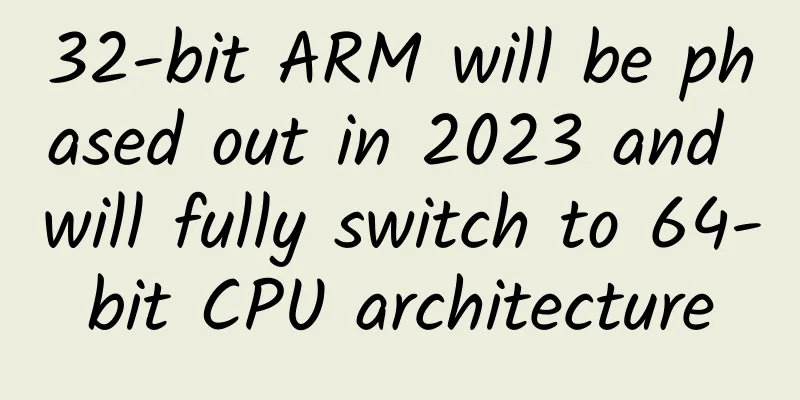32-bit ARM will be phased out in 2023 and will fully switch to 64-bit CPU architecture

|
Not long ago, ARM released the ARMv9 instruction set and launched the Cortex-X2/A710/A510 architecture based on it. This is a major update after the launch of ARMv8 10 years ago, and it is a full move towards a 64-bit instruction set. ARM recently made clear its determination to upgrade this generation of instruction sets to 64 bits. The official statement pointed out that in 2023, all of ARM's large and small core architectures will adopt 64 bits, and 32-bit instructions will be eliminated by then. As for the previous concerns that abandoning 32-bit would lead to compatibility issues, ARM believes that 64-bit is already a mature technology and there is no problem entering the pure 64-bit era. In the previous ARMv8 instruction set, ARM actually made 32-bit and 64-bit instruction sets at the same time. The purpose was to support 64-bit while retaining 32-bit for transition. Now it has been almost 10 years, and there is really nothing to worry about 64-bit. Among mobile phone processors, the iPhone 5s released by Apple in 2013 was the first to support 64-bit. The A7 processor was the first to launch the ARM 64-bit architecture. Later, Qualcomm also supported 64-bit on the Snapdragon 810. After Android 5.0, Google also natively supported 64-bit ARM processors. As for the application side, which is the most worrying, Apple required APP developers to support 64-bit in 2015, and Google's App Store was also upgraded to 64-bit support in 2019, so this is not a problem. There is also the relatively unique domestic market. In April this year, Xiaomi App Store, OPPO Software Store, vivo App Store, Tencent App Store, and Baidu Mobile Assistant announced that all applications released on each app store in the future must support the 64-bit Arm architecture in an orderly manner. Before the end of this year, all applications and games must upload APKs containing 64-bit builds as planned (covering updates to existing applications and releases of new versions). According to the schedule, all mobile Android applications in the Chinese market are expected to fully adopt 64-bit by the end of August 2022. Now it seems that ARM's slogan of eliminating 32-bit CPUs by 2023 is obviously still achievable.
|
<<: Android 12 details improvements: new chip in the status bar can display call duration
>>: Will iPad and Mac merge in the future?
Recommend
The reasons and solutions for the restricted traffic of Tik Tok!
With the advent of 5G in 2019, short videos, as t...
Liu Xifang Victoria's beautiful legs training
Liu Xifang Victoria's beautiful legs training...
How much does it cost to make a sports mini program in Anshan?
In order to better penetrate into various industr...
Flowers no longer have to take the blame, as they are actually the culprit for spring pollen allergies!
Sneezing, stuffy nose, rash... Do you have these ...
Dr. Mo, a leader in the technology industry: Why is Siri so stupid?
On October 12, Walt Mossberg (nicknamed "Dr....
This vaccine you got as a child can actually fight Alzheimer's disease?
More than 100 years ago, Calmette and Gering'...
VIP membership growth system of the three major mainstream video platforms!
In recent years, influenced by policies and marke...
Sneezing in the light is caused by brain dysfunction
I wonder if you have such a friend around you. Or...
Will Jupiter's hydrogen burn up and eventually become a small sun?
This topic has been discussed many times. Since f...
Can Xiaomi avoid the death spiral after the sharp drop in shipments?
Lei Jun said at a press conference a few days ago...
The powerful "king of soil": the "universal soil" in ultra-deep drilling projects
News reports that my country's oil and gas dr...
China owes the world an awesome advertising company!
As the national faces, the UK has BBH, the US has ...
Notice! Douyin, Baidu, and Toutiao's future marketing guidelines revealed~
Looking at the market, from the initial portal er...
How can we encourage users to actively share and attract traffic?
01 Since the Internet traffic dividend began to g...
How do emerging social tools break the monetization curse? Here are 3 suggestions
Meitu XiuXiu, which is considered to best represe...









